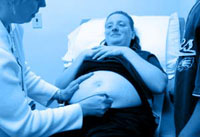Anesthesia given to pregnant women doesn’t affect learning ability of child in later life
 A recent study conducted by US experts at the Mayo Clinic indicated that anesthesia given to mothers during Cesarean section surgery has no adverse effect on the children's learning ability in later life.
A recent study conducted by US experts at the Mayo Clinic indicated that anesthesia given to mothers during Cesarean section surgery has no adverse effect on the children's learning ability in later life.
Research team used the data from the Rochester Epidemiology Project. They studied the medical reports of nearly 5,320 children who were born between 1976 and 1982 to mothers living in Olmsted County. The birth records were compared with academic achievement and IQ tests given to children in later life.
Data analysis revealed that children who received a single dose of anesthesia during their formative years of life showed no increased risk for learning disabilities; whereas children subjected to anesthesia multiple times seemed to have greater chances of developing learning disabilities in later years.
Lead researcher, Mayo Clinic Anesthesiologist Juraj Sprung, M. D., PhD said: "We found that the incidence of learning disabilities was equal between children who were delivered [normally] and those who were delivered via C-section but with general anesthesia. It's reassuring that the anesthetics required for Cesarean delivery do not appear to cause long-term brain problems."